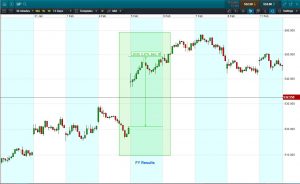This report is not a personal recommendation and does not take into account your personal circumstances or appetite for risk.
You’ve heard the old saying: “What’s good for the goose is good for the gander”. What moves some shares, can also push other shares higher or lower. Traders call this “read-across”.
Read-across can come from many sources. Corporate results from sector peers, economic data and political headlines can all produce such reaction. But not all read-across is the same and affect companies identically.
Firstly, there is sector read-across. One company’s share price goes up or down, other shares in the same sector follow. For example, oil supermajor Royal Dutch Shell reported strong results on 31 Jan, its shares +3.6%. Same day, BP shares +1.7%, while smaller rival Tullow Oil +2%. BP returned the favour when it reported its own results on 5 Feb (shares +5.2%), sending Shell’s share price +2.3% and Tullow Oil +2.3%.
Notice how read-across produces a share price reaction in other stocks, but the ripples are smaller. Strongest reaction to the directly affected stock. Weaker reaction to sector peers.
The idea behind sector this phenomenon is simple. If one company has great results, its usually due to the improved business environment. “A rising tide lifts all boats”. Oil prices rallied +35% in Jan-Feb, so no surprise that oil companies had great cash flows and sales growth. Same could be true for other factors. Local laws are the same for all companies. So, if a company notes a change in regulations, others in the same sector are also likely to benefit.
 Secondly, there is commercial read-across. Sector read-across is about market sentiment. But the commercial reaction is more direct. Big UK Index companies have commercial ties, partnerships, similar suppliers. A commercial decision by one company can have a ripple effect across the entire supply chain.
Secondly, there is commercial read-across. Sector read-across is about market sentiment. But the commercial reaction is more direct. Big UK Index companies have commercial ties, partnerships, similar suppliers. A commercial decision by one company can have a ripple effect across the entire supply chain.
Supermarket Sainsbury has been in merger talks with Wal-Mart’s ASDA grocery chain for a long time. on 20 Feb, UK regulator CMA said it has significant competion concerns about the merger that will be hard to address. Sainsbury shares predictably fell -18.5%. No surprise there.
But lets look at the rest of the sector. Tesco and Ocado shares were actually flat the same day. Where’s the read-across, you ask? The Sainsbury-ASDA tie up was a commercial affair. If it’s off the table, the trading environment doesn’t change for Tesco.
But it does for Morrisons! Analysts were widely expecting Morrisons to snap up all the stores that Sainsbury and ASDA would likely have had to sell if the merger went ahead. With the merger now likely off the table, Morrisons can’t expand its market share though M&A. Morrisons shares -5.3% on 20 Feb. Hence, commercial read-across.
Keeping track of market sentiment and trading relationships can be crucial for investors. When you buy oil company stock, you need to pay attention not just to its own results, but to market sentiment and commercial read-across too. As my colleague and Accendo’s head of research Mike says: “Don’t get doubled-crossed by read-across”.
There are hundreds of companies trading in London and many thousands more around the world. Read-across for the shares you own can come from an unexpected direction. Luckily, we have your back. Here at Accendo, we monitor these kinds of market relationships day in and day out.
Our research Gold Pass is tailor-made for people who want more out of their research than simple share price levels. If you want an extra string to your bow, be it the hottest momentum, a solid support trendline, or an in-depth corporate results analysis, Accendo Markets is here for you.
Charlie Rexstrew, Trader at Accendo Markets, 1 March 2019
This research is produced by Accendo Markets Limited. Research produced and disseminated by Accendo Markets is classified as non-independent research, and is therefore a marketing communication. This investment research has not been prepared in accordance with legal requirements designed to promote its independence and it is not subject to the prohibition on dealing ahead of the dissemination of investment research. This research does not constitute a personal recommendation or offer to enter into a transaction or an investment, and is produced and distributed for information purposes only.
Accendo Markets considers opinions and information contained within the research to be valid when published, and gives no warranty as to the investments referred to in this material. The income from the investments referred to may go down as well as up, and investors may realise losses on investments. The past performance of a particular investment is not necessarily a guide to its future performance.
Prepared by Michael van Dulken, Head of ResearchComments are closed.